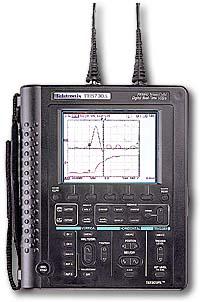
class Tektro {
private:
ofstream liout;
ifstream liin;
void set(char*);
public:
Tektro();
Tektro(char*);
~Tektro();
string init();
float liesMesswert();
};
Tektro::Tektro(){
liout.open("/dev/ttyS1",ios::app);
liin.open("/dev/ttyS1",ios::in);
if (!liin || !liout) {
cout<<"RS-232 kann nicht geoeffnet werden!"<<endl;exit(1);
}
set("/dev/ttyS1");
}
Tektro::Tektro(char* device){
liout.open(device,ios::app);
liin.open(device,ios::in);
if (!liin || !liout) {
cout<<"RS-232 kann nicht geoeffnet werden!"<<endl;exit(1);
}
set(device);
}
Tektro::~Tektro(){
//Filedescriptor schliessen + lcd
liout.close();
liin.close();
}
void Tektro::set(char * device){
struct termios settings;
int fd = open(device, O_RDWR | O_NOCTTY);
if (fd == -1){cout << "ha RS-232 kann nicht geoeffnet
werden!"<<endl;exit(1);}
//Setzen der Inputflags
settings.c_iflag = IGNPAR | IGNPAR;
//Setzen der Outputflags
settings.c_oflag = 0;
//Setzen der Controlflags
settings.c_cflag = CS8;
//Setzen der Localflags
settings.c_lflag = 0;
// Maximale Zeit, die beim Lesen gewartet wird (in 0.1s)
settings.c_cc[VTIME] = 10;
// Minimale Anzahl der zu lesenden Bytes
settings.c_cc[VMIN] = 0;
//Setzen der Uebertragungsgeschwindigkeit
cfsetspeed(&settings, B9600);
//Einstellungen an Schnittstelle uebergeben
tcsetattr(fd, TCSANOW, &settings);
//return (fd);
close(fd);
}float Tektro::liesMesswert(){
liout << "DMM:VAL?\r" << endl;
string s;
float fre;
liin >> s;
liin >> fre;
return(fre);
}
int main(int argc, char* argv[]){
int delay;
int numpts;
string s;
char* filename;
float fr;
Tektro* a;
ofstream file;
if (argc > 1) a = new Tektro(argv[1]);
else a = new Tektro();
cout << "Zeit zwischen zwei Messpunkten ?" << endl;
cin >> delay;
cout << "Anzahl Messpunkte ?" << endl;
cin >> numpts;
cout << "Dateiname ?" << endl;
cin >> filename;
file.open(filename,ios::noreplace | ios::out);
if (!file){
cout << filename<< " gibts schon Du Dussel!"<<endl; }
else{
for (int i=0;i<numpts;i++){
// file << i*tBase << "\t"<<data[i]<<endl;
fr = a -> liesMesswert();
file << i*delay << "\t"<<fr<<endl;
cout << i*delay<<"\t"<<
fr << endl;
sleep (delay);
}
}
file.close();
cout << "file zu" <<endl;
delete a;
cout << "Schnittstelle wech " << endl;
return 0;
}